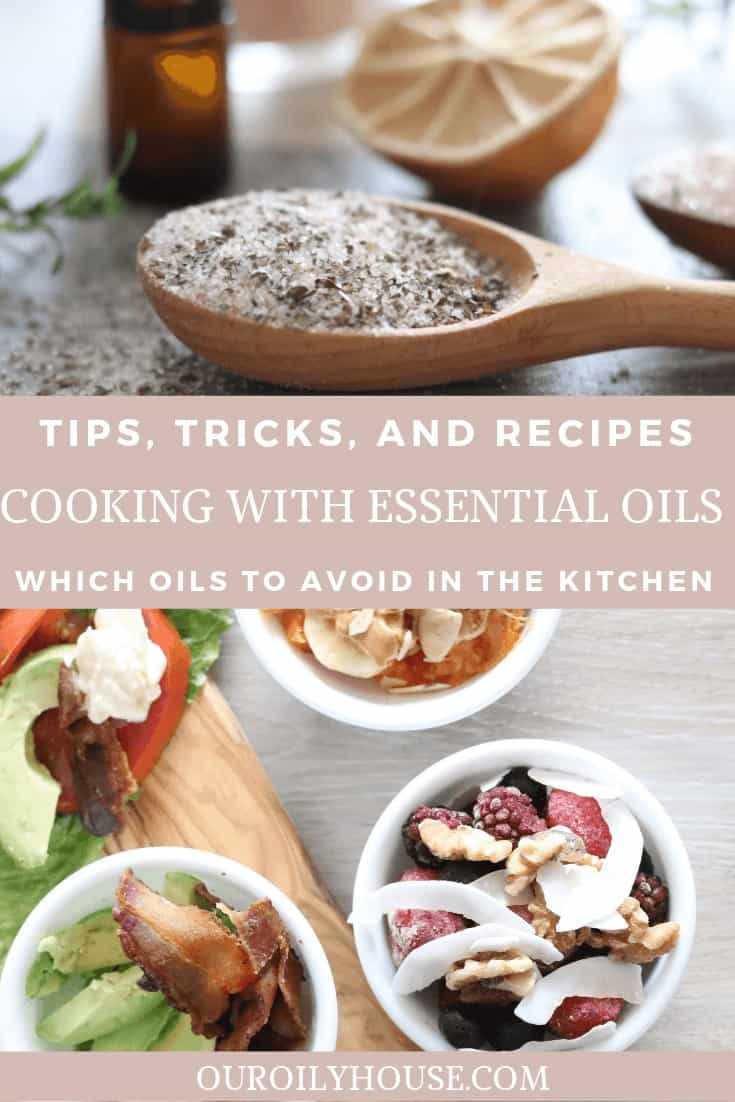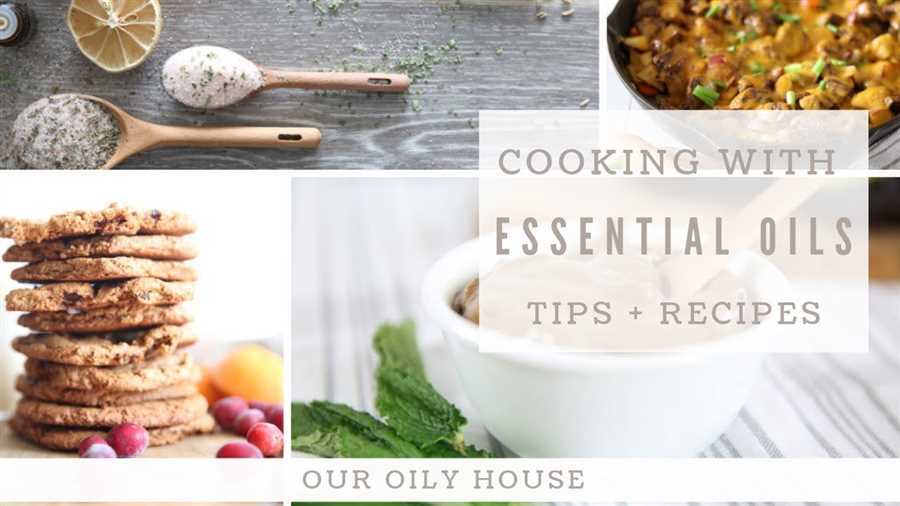Essential oils are highly concentrated plant extracts that are beloved for their aromatic properties and potential health benefits. They have long been used in various forms of alternative medicine, such as aromatherapy, but their use in cooking is a relatively new trend. However, before you start adding drops of essential oils to your recipes, it’s important to understand the safety and best practices associated with cooking with these potent substances.
Many essential oils are not safe for ingestion and can be toxic if consumed in large quantities. It’s essential to only use pure, food-grade essential oils that are labeled as safe for culinary use. These oils have been specially processed and tested to ensure they meet strict standards for purity and safety. It’s also important to note that even food-grade oils should be used sparingly, as their concentration can be overwhelming and overpowering in recipes.
When cooking with essential oils, it’s best to start with just a drop or two and gradually increase the amount to achieve the desired flavor. It’s also recommended to dilute the oils with a carrier oil or another ingredient, such as honey or sugar, to prevent irritation or sensitivity. Additionally, certain oils may be more suitable for cooking than others. Citrus oils, for example, are commonly used in desserts and beverages, while herb and spice oils can add unique flavors to savory dishes.
However, it’s important to keep in mind that the use of essential oils in cooking is still a controversial topic in the culinary world. Some experts believe that the high heat used in cooking can alter the chemical composition of the oils and diminish their therapeutic properties. Others argue that when used correctly, essential oils can enhance the flavor and nutritional value of dishes. Ultimately, it’s up to the individual to decide whether they want to incorporate essential oils into their culinary endeavors.
Is Cooking with Essential Oils Safe?
Using essential oils in cooking has gained popularity in recent years, as they can add unique flavors and aromas to recipes. However, many people have concerns about the safety of using these highly concentrated oils in food preparation.
While some essential oils can be safe for consumption, it is crucial to use caution and ensure their proper usage. Not all essential oils are created equal, and some are not suitable for ingestion at all.
Quality matters
When considering cooking with essential oils, it is essential to choose high-quality oils from reputable brands. Look for oils that are labeled as “food grade” or “culinary grade.” These oils undergo rigorous testing and are meant to be used in cooking.
Using poor-quality or synthetic essential oils can be dangerous, as they may contain harmful additives or contaminants that can negatively affect your health.
Dilution and moderation

Essential oils are highly concentrated and potent, so they should never be used undiluted or in large quantities. It is generally recommended to dilute essential oils with a carrier oil or another food ingredient before using them in cooking.
Start by using a small amount of essential oil and gradually adjust to taste. Remember that a little goes a long way, and even a drop or two can provide sufficient flavor. Overusing essential oils can lead to overpowering flavors and potential health risks.
Considerations and precautions
While some essential oils are safe for consumption, not all are suitable for cooking. Certain oils, such as wintergreen or pennyroyal, contain compounds that can be toxic or cause adverse reactions when ingested.
Pregnant women, breastfeeding mothers, and individuals with specific medical conditions should exercise extra caution when using essential oils in cooking. It is best to consult a healthcare professional or an aromatherapist for personalized advice.
Additionally, essential oils should never be substituted for fresh herbs, spices, or other natural flavorings in recipes. They can complement and enhance the flavors, but they should not be the sole flavoring agent.
To conclude, cooking with essential oils can be safe when done correctly and with the right oils. However, it is crucial to choose high-quality oils, dilute them properly, and use them in moderation. It is always best to err on the side of caution and seek professional advice when unsure.
Benefits and Risks to Consider
While cooking with essential oils can add unique and intense flavors to dishes, it is important to consider both the benefits and risks associated with their use.
Benefits

1. Enhanced Flavors: Essential oils are highly concentrated, so a small amount can go a long way in adding flavor to your dishes. They can offer strong and distinct tastes that are difficult to achieve with other ingredients.
2. Aromatherapy Benefits: Many essential oils have health benefits when inhaled. While cooking, the aroma of the oils can enhance your mood, relieve stress, and even boost your immune system.
3. Versatility: Essential oils can be used in a variety of different recipes, including desserts, marinades, dressings, and baked goods. With a wide range of flavors available, you have the opportunity to experiment and create unique dishes.
Risks
1. Quality and Purity: It is important to ensure that you are using high-quality, food-grade essential oils. Some oils may contain additives or synthetic ingredients that can be harmful when ingested.
2. Potential Reactions: Essential oils can cause allergic reactions in some people, especially those with sensitivities or allergies. It is advisable to do a patch test before using essential oils for cooking.
3. Dosage and Dilution: Essential oils are potent and should be used sparingly. Using too much can overpower the dish and lead to an unpleasant flavor. It is recommended to dilute essential oils with a carrier oil or mix them with other ingredients.
| Benefits | Risks |
|---|---|
| Enhanced flavors | Quality and Purity |
| Aromatherapy benefits | Potential Reactions |
| Versatility in recipes | Dosage and Dilution |
Choosing the Right Essential Oils for Cooking
When it comes to cooking with essential oils, it’s important to choose the right oils to ensure both safety and delicious flavors. Not all essential oils are suitable for consumption, so it’s crucial to do your research and select oils that are specifically labeled as safe for internal use.
Consideration of Quality
First and foremost, ensure that you are purchasing high-quality essential oils that are pure and free from any additives or contaminants. Look for oils that are labeled as “therapeutic grade” or “food grade” to ensure their safety and integrity. It is also advisable to buy oils from reputable sources or companies that specialize in essential oils to guarantee the highest quality.
Understanding Flavor Profiles
Each essential oil has its own unique flavor profile, so it’s essential to understand the taste of different oils before incorporating them into your recipes. Some oils, like lemon or peppermint, have strong and distinct flavors, while others, like lavender or basil, are more subtle. Consider the flavors that you are looking to enhance or complement in your dishes and choose oils accordingly.
| Essential Oil | Flavor Profile | Suggested Use |
|---|---|---|
| Lemon | Bright and citrusy | Salad dressings, desserts, seafood |
| Peppermint | Cool and minty | Beverages, chocolate desserts |
| Lavender | Herbaceous and floral | Tea, baked goods, ice cream |
| Basil | Earthy and sweet | Pasta, tomato-based dishes |
Other popular essential oils for cooking include oregano, thyme, cinnamon, and ginger, among others. These oils can add unique and intense flavors to your dishes, but be sure to use them sparingly as they are potent.
Lastly, always start with a small amount of essential oil and gradually increase the quantity to achieve your desired flavor. Remember that a little goes a long way, and you can always add more if needed. Enjoy exploring the world of cooking with essential oils and enhancing your culinary creations with their aromatic flavors!
Tips for Selecting Quality Oils
When it comes to using essential oils in cooking, it is important to select high-quality oils to ensure both safety and flavor. Here are some tips for choosing the best essential oils for your culinary creations:
1. Look for purity: It is crucial to choose oils that are 100% pure and free from any additives or contaminants. Check the label for information on purity, and opt for oils that have been tested by a third-party lab.
2. Choose organic: Organic essential oils are made from plants that have been grown without the use of chemical pesticides or fertilizers. By selecting organic oils, you can avoid any potential chemical residues in your culinary preparations.
3. Consider sourcing: The quality of essential oils can be influenced by where the plants are grown and how they are harvested. Look for oils that are sourced from reputable producers who have strict quality control standards in place.
4. Check for proper labeling: Ensure that the essential oil you choose is labeled for internal use. Not all essential oils are safe to ingest, so always check the packaging to make sure it is suitable for culinary purposes.
5. Look for a clear expiration date: Like any other food product, essential oils can go bad over time. Check for an expiration date on the bottle to ensure that you are purchasing a fresh product.
By following these tips, you can select high-quality essential oils that are safe and suitable for cooking. Remember to use them sparingly, as their potency can be much stronger than regular herbs and spices.
Questions and answers
Are essential oils safe to cook with?
Yes, some essential oils are safe to cook with, but it is important to use them properly and in moderation.
Why would someone want to cook with essential oils?
Some people choose to cook with essential oils because they provide a concentrated flavor and aroma that can enhance dishes.
Which essential oils are safe to use in cooking?
Some safe essential oils to use in cooking include citrus oils, such as lemon or orange, as well as herbs like basil or rosemary.
How should essential oils be used in cooking?
Essential oils should be used sparingly in cooking, as they are highly concentrated. It is best to add a drop or two to a recipe or dish, and adjust to taste.
Can essential oils be used in baking?
Yes, essential oils can be used in baking. They can add a unique flavor to baked goods, but again, it is important to use them in moderation.







